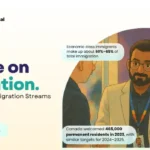New Canada Study Permit Changes You Should Know
Canada’s 2026 International Student Plan
On November 25, 2025, Canada released its official plan for how many international students it will accept in 2026. This update brings major changes, so it’s important for anyone planning to study in Canada to pay attention.
Why Canada Is Changing Its Student Permit System
Canada has seen a large increase in temporary residents including international students and temporary workers. As a result, the government now wants to reduce that number to make services like housing, healthcare, and public infrastructure more manageable. This is why the country is scaling back how many new students it will accept.
2026 Study Permit Limits
For 2026, Canada intends to issue up to 408,000 study permits. This total includes both:
- New international students arriving from abroad
- Existing students in Canada applying for permit extensions
However, this new cap is lower than recent years. It shows that Canada is moving away from rapid growth and focusing more on sustainability and proper resource management.
Special Rule for Graduate Students
Starting January 1, 2026, students applying for Master’s or Doctoral programs at public institutions will get a special benefit: they will no longer need a Provincial or Territorial Attestation Letter (PAL/TAL).
This means:
- Graduate-level applicants will enjoy a clearer, simpler application process.
- Canada is encouraging high-value academic talent, especially for research, innovation, and advanced industries.
At the same time, other categories of applicants (like those applying for undergrad or private colleges) will still follow the stricter PAL/TAL rules.
How Canada’s Provinces Share Study Permits
Canada divides the student permit quota among its provinces and territories. Provinces with more schools and a history of high international enrollment — like Ontario, Quebec, and British Columbia — receive the largest allocations. Smaller provinces receive lower numbers.
Because of this, where you plan to study will greatly affect your chances of getting a permit.
What the Changes Mean for Colleges and Universities
Higher education institutions must now adjust to fixed quotas. As a result:
- Schools need to plan admissions carefully
- Institutions with lower approval rates may face tighter restrictions
- Universities must balance enrolment goals with compliance and capacity
In short, colleges will have less flexibility, and students may face more competition.
How Students Are Affected by the New Rules
The 2026 changes will have different effects depending on the type of student:
- Graduate students (Master’s / PhD): Their path may become easier thanks to the new PAL/TAL exemption
- Undergraduate or private-college applicants: They will face more competition due to lower permit allocations
- Existing students in Canada: Extensions may be harder—good documents and careful planning will matter more than ever
How This Fits Into Canada’s Long-Term Immigration Strategy
The 2026 student permit limits align with Canada’s broader goal: reduce reliance on temporary residents, while giving priority to skilled and innovative talent. Over the next few years, Canada plans to:
- Lower its temporary resident population
- Increase intake for high-demand skilled workers
- Balance immigration with infrastructure capacity
This shift reflects a more deliberate, sustainable approach to immigration.
What You Should Do If You Plan to Study in Canada
If you’re thinking of studying in Canada soon, here are some important steps:
- Prefer Master’s or PhD programs at public institutions, if possible
- Choose provinces wisely some have stricter quotas than others
- Start preparing your documents early and ensure everything is valid
- Keep an eye on official announcements from immigration authorities
- Apply as soon as possible delays might reduce your chance
Final Thoughts
Canada’s 2026 student permit plan marks a significant shift from previous years. While the overall number of permits will decrease, the new rules for graduate students offer a promising opportunity for those pursuing advanced studies.
However, competition will increase, especially for undergraduates. For aspiring international students, careful planning, quick action, and informed choices will be key in navigating these changes successfully.
Get in touch with us
Receive professional advice on any of your questions regarding Canadian immigration. get in touch with us, experienced immigration consultants from SPS Global. For additional information, contact support@spscanada.com (Canada) or support.amd@spscanada.com (Ahmedabad), or by phone at (1) 905-362-9393 (Canada) or +919586226232 (Ahmedabad).



